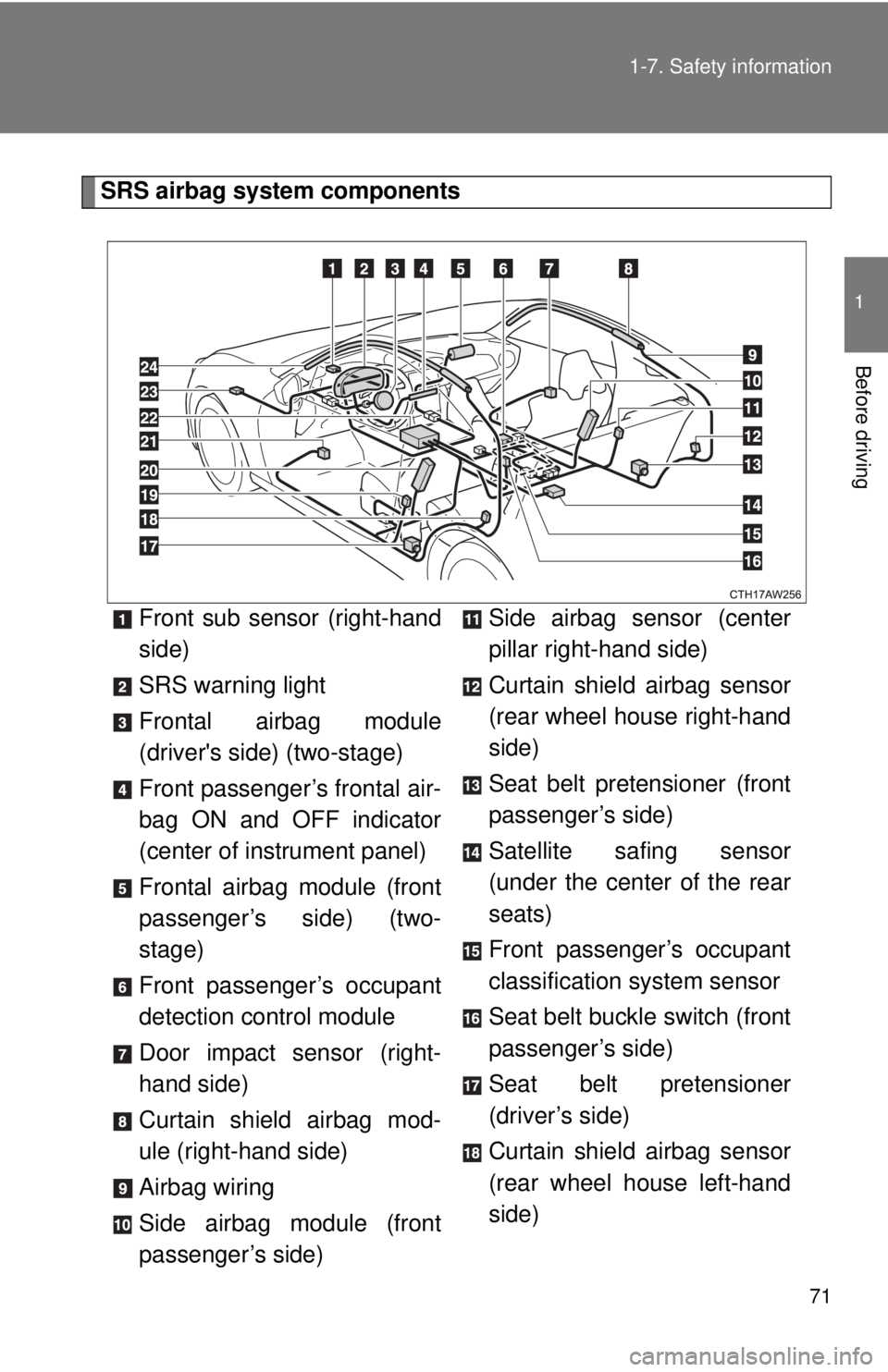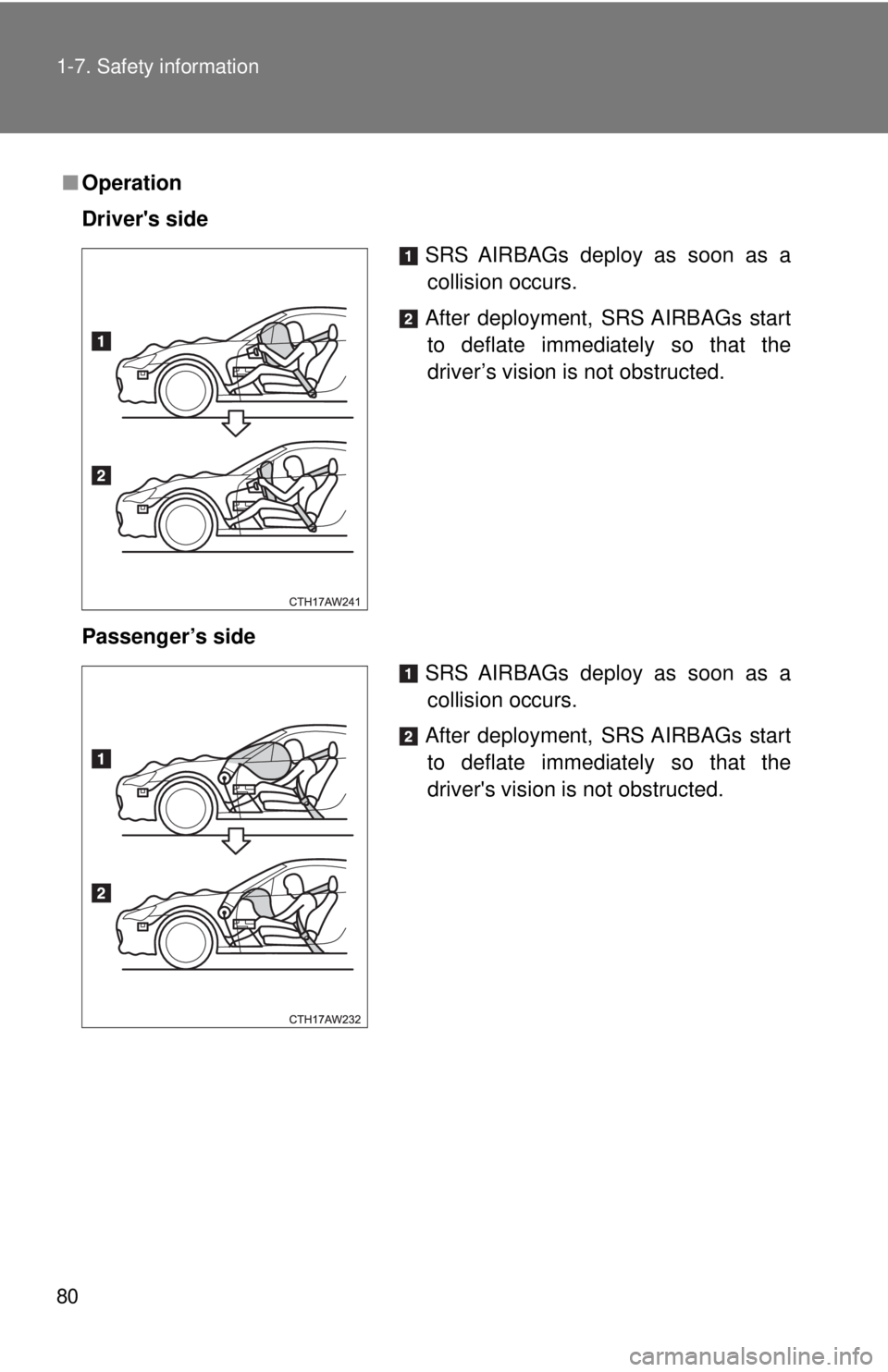TOYOTA 86 2017 Manual PDF
Manufacturer: TOYOTA, Model Year: 2017, Model line: 86, Model: TOYOTA 86 2017Pages: 428, PDF Size: 5.25 MB
Page 71 of 428

711-7. Safety information
1
Before driving SRS airbag system components
Front sub sensor (right-hand
side)
SRS warning light
Frontal airbag module
(driver's side) (two-stage)
Front passenger’s frontal air-
bag ON and OFF indicator
(center of instrument panel)
Frontal airbag module (front
passenger’s side) (two-
stage)
Front passenger’s occupant
detection control module
Door impact sensor (right-
hand side)
Curtain shield airbag mod-
ule (right-hand side)
Airbag wiring
Side airbag module (front
passenger’s side) Side airbag sensor (center
pillar right-hand side)
Curtain shield airbag sensor
(rear wheel house right-hand
side)
Seat belt pretensioner (front
passenger’s side)
Satellite safing sensor
(under the center of the rear
seats)
Front passenger’s occupant
classification system sensor
Seat belt buckle switch (front
passenger’s side)
Seat belt pretensioner
(driver’s side)
Curtain shield airbag sensor
(rear wheel house left-hand
side)
Page 72 of 428

721-7. Safety information
Your vehicle is equipped with ADVANCED AIRBAGS designed based
on US motor vehicle safety standards (FMVSS208). The airbag sys-
tem controls airbag deployment power for the driver and front pas-
senger. The front passenger's airb ag system consists of the front
passenger occupant detect ion control module etc.
The main SRS airbag system components are shown above. The
SRS airbag system is controlled by the airbag control module. The
airbag control module consists of an airbag sensor.
In certain types of severe front or side impacts, the SRS airbag sys-
tem triggers the airbag inflators. A chemical reaction in the inflators
quickly fills the airbags with non-toxic gas to help restrain the motion
of the occupants. Side airbag sensor (center
pillar left-hand side)
Side airbag module (driver’s
side)
Door impact sensor (left-
hand side) Airbag control module
(including impact sensors
and rollover sensors)
Front sub sensor (left-hand
side)
Curtain shield airbag mod-
ule (left-hand side)
■ If the SRS airbags deploy (inflate)
● Slight abrasions, burns, bruising et c., may be sustained from SRS air-
bags, due to the extremely high speed deployment (inflation) by hot
gases.
● A loud noise and white powder will be emitted.
● Parts of the airbag module (steering wheel hub, airbag cover and inflator)
as well as the front seats, parts of the front and rear pillars, and roof side
rails, may be hot for several minutes. The airbag itself may also be hot.
● The windshield may crack.
Page 73 of 428

731-7. Safety information
1
Before driving Toyota advanced frontal airbag system
Your vehicle is equipped with a To yota advanced frontal airbag sys-
tem that complies with the new advanced frontal airbag requirements
in the amended Federal Motor Vehicle Safety Standard (FMVSS) No.
208.
The Toyota advanced frontal airbag system automatically determines
the deployment force of the driver’s SRS frontal airbag at the time of
deployment as well as whether or not to activate the front passen-
ger’s SRS frontal airbag and, if acti vated, the deployment force of the
SRS frontal airbag at the time of deployment.
Your vehicle has warning labels on the driver’s and front passenger’s
sun visors beginning with the phrase “EVEN WITH ADVANCED AIR
BAGS” and a tag attached to the gl ove box lid beginning with the
phrase “Even with Advanced Air Bags”. Make sure that you carefully
read the instructions on the warning labels and tag.
Always wear your seat belt. The Toyota advanced frontal airbag sys-
tem is a supplemental restraint system and must be used in combina-
tion with a seat belt. All occupant s should wear a seat belt or be
seated in an appropriate child restraint system.
The driver’s SRS frontal airbag is st owed in the center portion of the
steering wheel. The front passenger’s SRS frontal airbag is stowed
near the top of the dashboard under an “SRS AIRBAG” mark.
In a moderate to severe frontal collision, the following components
deploy.
● SRS frontal airbag for driver
● SRS frontal airbag for front passenger
These components supplement the s eat belts by reducing the impact
to the occupant’s head and chest.
Page 74 of 428

741-7. Safety information
■ Driver’s SRS frontal airbag
The driver’s SRS frontal airbag uses a dual stage inflator. The inflator oper-
ates in different ways depending on the severity of impact.
Have the system inspected by your Toyota dealer immediately if the SRS
warning light illuminates.
NOTE
The driver’s SRS side airbag and SRS curtain shield airbag are not con-
trolled by the Toyota advanced frontal airbag system.
■ Front passenger’s SRS frontal airbag
The front passenger’s SRS frontal airbag uses a dual stage inflator. The
inflator operates in different ways depending on the severity of impact.
The occupant classification system sensor is installed under the seat uphol-
stery and monitors the physique and posture of the front passenger. Using
this information, the occupant classification system determines whether the
front passenger’s SRS frontal airbag should be deployed or not.
The occupant classification system may not inflate the front passenger’s
SRS frontal airbag even when the driver’s SRS frontal airbag deploys. This
is normal. In this case, although the front passenger’s SRS frontal airbag
does not operate, the front passenger’s seat belt pretensioner operates with
the driver’s seat belt pretensioner. For details about the seat belt preten-
sioner, refer to “Seat belt pretensioners”. ( → P. 43)
Observe the following precautions. Failure to do so may prevent the Toyota
advanced frontal airbag system from functioning correctly or cause the sys-
tem to fail.
● Do not apply any strong impact to the front passenger’s seat.
● Do not spill liquid on the front passenger’s seat. If liquid is spilled, wipe it
off immediately.
● Do not remove or disassemble the front passenger’s seat.
● Do not install any accessory (such as an audio amplifier) other than a
genuine Toyota accessory under the front passenger’s seat.
● Do not place anything (shoes, umbrella, etc.) under the front passenger’s
seat.
● Do not place a magnet near the seat belt buckle.
Page 75 of 428

751-7. Safety information
1
Before driving If the seat belt buckle switch and/or front passenger’s occupant classification
system have failed, the SRS warning light will illuminate. Have the system
inspected by your Toyota dealer immediately if the SRS warning light illumi-
nates.
If your vehicle has sustained impact, this may affect the proper function of
the Toyota advanced frontal airbag system. Have your vehicle inspected at
your Toyota dealer. Do not use the front passenger’s seat while driving the
vehicle to your Toyota dealer.
NOTE
The front passenger’s SRS side airbag an d SRS curtain shield airbag are
not controlled by the Toyota advanced frontal airbag system.
■ Passenger’s frontal airbag ON and OFF indicators
→ P. 104
■ Occupant classification system
The occupant classification system sensor is installed under the seat uphol-
stery and monitors the physique and posture of the front passenger. Using
this information, the occupant classification system determines whether the
front passenger’s SRS frontal airbag should be deployed or not.
If the front passenger’s seat cushion is wet, this may adversely affect the
ability of the system to determine deployment. If the seat cushion is wet, the
front passenger should stop sitting on the front passenger’s seat. Wipe off
liquid from the seat immediately, let the seat dry naturally and then check the
SRS warning light as follows.
● If the SRS warning light illuminates, keep the seat dry until the warning
light turns off. If the SRS warning light stays on even when the seat has
dried, do not allow anyone to sit on the front passenger’s seat and have
the system checked by your Toyota dealer.
● If the SRS warning light does not illuminate, check that the front passen-
ger’s frontal airbag ON and OFF indicators work properly. If the indicators
do not work properly, do not allow anyone to sit on the front passenger’s
seat and have the system checked by your Toyota dealer.
Page 76 of 428

761-7. Safety information
Also, if luggage or electronic devices are placed on the front passenger’s
seat, this may adversely affect the ability of the system to determine deploy-
ment. This may prevent the front passenger’s frontal airbag ON and OFF
indicators from working properly. Check that the indicators work properly.
When the OFF indicator turns off and the ON indicator illuminates, the front
passenger’s frontal airbag may deploy during a collision. Remove luggage
and electronic devices from the front passenger’s seat.
NOTE
This device complies with Part 18 of the FCC Rules. This device may cause
interference. If this device causes interference, consult the nearest Toyota
dealer. Also, for maintenance of the system, consult the nearest Toyota
dealer.
■ Conditions in which front passenger’ s SRS frontal airbag is not acti-
vated
The front passenger’s SRS frontal airbag will not be activated when any of
the following conditions are met regarding the front passenger’s seat:
● The seat is empty.
● The seat is equipped with an appropriate child restraint system and an
infant is restrained in it.
● The occupant changed their posture after the occupant load is judged.
● The front passenger’s occupant classification system is malfunctioning.
WARNING
When the front passenger’s seat is occupied by an infant in an appropriate
child restraint system, observe the following precautions. Failure to do so may
interfere with the proper operation of the occupant classification system, acti-
vating the front passenger’s SRS frontal airbag even though that seat is occu-
pied by the infant in the child restraint system.
● Do not place any article (including electronic devices) on the seat other than
the infant in the child restraint system.
● Do not place more than one infant in the child restraint system.
Page 77 of 428

771-7. Safety information
1
Before driving ■ If the front passenger’s frontal airbag ON indi cator illuminates and the
OFF indicator turns off even when an in fant or a small child is in a child
restraint system (inc luding booster seat)
Turn the engine switch to the “LOCK” position if the front passenger’s frontal
airbag ON indicator illuminates and the OFF indicator turns off even when an
infant or a small child is in a child restraint system (including booster seat).
Remove the child restraint system from the seat. By referring to the child
restraint manufacturer’s recommendations as well as the child restraint sys-
tem installation procedures in “Child restraint systems” ( → P. 112), correctly
install the child restraint system. Turn the engine switch to the “ON” position
and make sure that the front passenger’s frontal airbag ON indicator turns
off and the OFF indicator illuminates.
If still the ON indicator remains illuminated while the OFF indicator turns off,
take the following actions.
● Ensure that no article is placed on the seat other than the child restraint
system and the child occupant.
● Ensure that the backward-forward position and seatback of front passen-
ger’s seat are locked into place securely by moving the seat back and
forth.
If the ON indicator still remains illuminated while the OFF indicator turns off
after taking relevant corrective actions described above, relocate the child
restraint system to the rear seat and immediately contact your Toyota dealer
for an inspection.
NOTE
When a child who has outgrown a child restraint system or a small adult is
seated in the front passenger’s seat, the Toyota advanced frontal airbag sys-
tem may or may not activate the front passenger’s SRS frontal airbag
depending on the occupant’s seating posture. The child should always wear
the seat belt when sitting in the seat irrespective of whether the airbag is
deactivated or activated. If the front passenger’s SRS frontal airbag is acti-
vated (the ON indicator remains illuminated while the OFF indicator turns
off), take the following actions.
Page 78 of 428

781-7. Safety information
● Ensure that no article is placed on the seat other than the occupant.
If the ON indicator still remains illuminated while the OFF indicator turns off
despite the fact that the actions noted above have been taken, seat the
child/small adult in the rear seat and immediately contact your Toyota dealer
for an inspection. Even if the system has passed the dealer inspection, it is
recommended that on subsequent trips the child/small adult always take the
rear seat.
Children who have outgrown a child restraint system should always wear the
seat belt irrespective of whether the airbag is deactivated or activated.
■ Conditions in which front passenger’ s SRS frontal airbag is activated
The front passenger’s SRS frontal airbag will be activated for deployment
upon impact when any of the following conditions are met regarding the front
passenger’s seat.
● When the seat is occupied by an adult.
● When a certain item(s) (e.g. jug of water) is placed on the seat.
Page 79 of 428

791-7. Safety information
1
Before driving ■ If the passenger’s frontal airbag OFF indicator illum inates and the ON
indicator turns off even when the fr ont passenger’s seat is occupied by
an adult
This can be caused by the adult incorrectly sitting in the front passenger’s
seat. Turn the engine switch to the “LOCK” position. Ask the front passenger
to set the seatback to the upright position, sit up straight in the center of the
seat cushion, correctly fasten the seat belt, position his/her legs out forward,
and adjust the seat to the rearmost position. Turn the engine switch to the
“ON” position. If the OFF indicator remains illuminated while the ON indica-
tor remains off, take the following actions.
● Turn the engine switch to the “LOCK” position.
● Make sure that the front passenger does not use a blanket, seat cushion,
seat cover, seat heater or massager, etc.
● If wearing excessive layers of clothing, the front passenger should
remove any unnecessary items before sitting in the front passenger’s
seat, or should sit in a rear seat.
● Next, turn the engine switch to the “ON” position and wait 6 seconds to
allow the system to complete self-checking. Following the system check,
both indicators turn off for 2 seconds. Now, the ON indicator should illu-
minate while the OFF indicator remains off.
If the OFF indicator still remains illuminated while the ON indicator remains
off, ask the occupant to move to the rear seat and immediately contact your
Toyota dealer for an inspection.
Page 80 of 428

801-7. Safety information
■ Operation
Driver's side
Passenger’s side SRS AIRBAGs deploy as soon as a
collision occurs.
After deployment, SRS AIRBAGs start
to deflate immediately so that the
driver’s vision is not obstructed.
SRS AIRBAGs deploy as soon as a
collision occurs.
After deployment, SRS AIRBAGs start
to deflate immediately so that the
driver's vision is not obstructed.